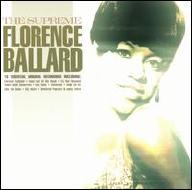The Primettes played hops, talent shows, and house parties for fun and experience. They tried to get a deal with Berry Gordy's Motown before they graduated from high school, only to be told to try again after they finished; they cut a one-off record for the Lupine label, did backing sessions for Lupine-affiliated labels, and were present during occasional sessions for Gordy. Their single, Tears of Sorrow b/w Pretty Baby, didn't leave make much of an impression but displayed compelling harmonies and fascinating leads. Around the time of its release, Ballard was sexually assaulted by future professional basketball star Reggie Harding. This greatly altered the singer's outlook and behavior.
Gordy signed the Primettes the second time around in 1961. After a renaming to the Supremes (Gordy didn't like the Primettes), they cut their first single on Tamla; parental pressures forced Martin to quit shortly thereafter and I Want a Guy flopped. Soon, the producers zeroed in on Earle and rarely wrote anything for Wilson or Ballard. After a series of flops, number one smashes became automatic. The pace was frantic and Motown muddied the water by pushing Wilson and Ballard out of the limelight to spotlight Ross.
Ballard didn't take the snub well. The breaker came when she tired of the relentless pace and started missing gigs. By 1967, Cindy Birdsong (formerly with Patti LaBelle the Bluebelles) had replaced her as a member of the Supremes. Lawsuits ensued. The money Ballard thought was sitting in a bank turned out to be a pittance. She married Thomas Chapman, a former Motown chauffeur, in 1968, and through various connections inked a deal with ABC-Paramount.
George Kerr produced her first single, It Doesn't Matter How I Say It (1968), but radio play was almost nonexistent. She completed an album, ...You Don't Have To, that ABC left for dead. Despite gigs opening for Wilson Pickett, some television appearances, performing with Bill Cosby, and singing at President Nixon's inauguration party, Ballard experienced no commercial success. ABC released Love Ain't Love in the fall of 1968 but let it languish. The label had soured on Ballard, some say because of Chapman's constant demands, and didn't extend her contract. She never got another record deal.
Within a few years, Ballard's personal and financial conditions went from bad to abject. She moved into public housing, and Chapman -- with whom she had three children -- left the family. After receiving an insurance settlement in 1975, she cleaned up her situation and made another go at recapturing stardom. An appearance at Detroit's Ford Auditorium gave her a needed boost. She reconciled with Chapman, purchased a new house, and did television. But the melancholy years, fueled by chemicals and alcohol, weakened her system and caused a fatal cardiac arrest on February 22, 1976. She was 32 years old.
In 2001, the U.K.-based Spectrum label released The Supreme Florence Ballard, a compilation featuring her released and previously unreleased solo recordings. ~ Andrew Hamilton, Rovi












